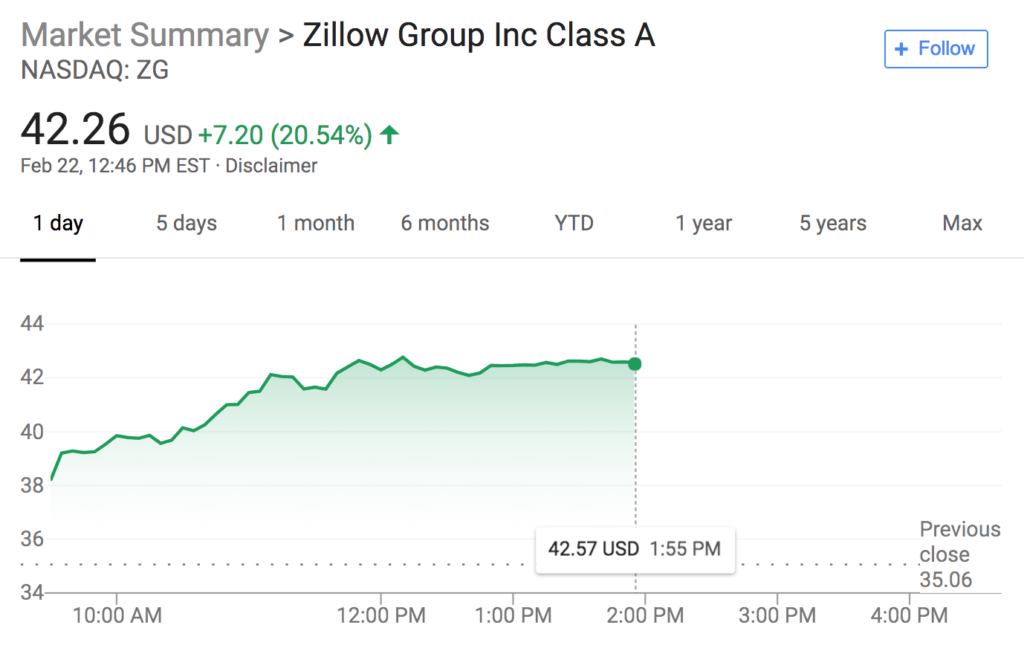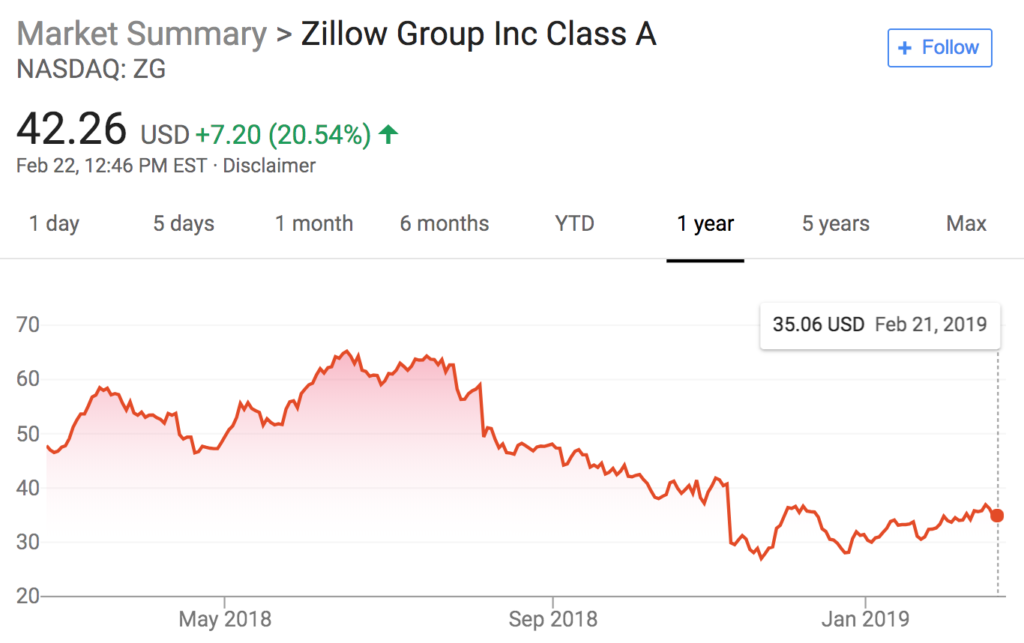Zillow’s stock price shot up by more than 25 percent Friday after the company revealed Thursday evening that co-founder Rich Barton would step back into the role of chief executive.
Zillow stock closed at $43.71, a major jump from the day’s opening price of just under $39 per share. The surge followed the company’s announcement, made the prior evening during an earnings release, that Barton would replace Spencer Rascoff as CEO. Barton co-founded Zillow in 2005, served as CEO until 2010, and after that, served as executive chairman of the real estate tech company.

Credit: Google
Friday’s skyrocketing stock prices bucked a trend of post-earnings losses that had plagued Zillow since last spring, when the company said it was getting into iBuying via the expansion of its existing Instant Offers program. Immediately after that announcement, shares fell from nearly $54 to about $48.
Zillow’s shares soon recovered and hit all time highs in June, but tanked again after an August earnings call where the company discussed the acquisition of a mortgage company. Bank of America Merrill Lynch also downgraded the company’s stock at that time.

Credit: Google
Finally, Zillow stock fell off a cliff after a November earnings report, going from more than $40 per share to less than $30. The stock saw some modest recovery in the following weeks, but even to this day is still trading below the prices it fetched prior to that November report.
 How to launch your career in high-end real estate
A leading agent shares you how can stand out from the crowd READ MORE
How to launch your career in high-end real estate
A leading agent shares you how can stand out from the crowd READ MORE
Leading up to Thursday’s earnings report, investors seemed to expect more of the same, with Zillow’s stock losing ground over the week until it bottomed out Thursday morning at just over $34 per share. But instead, shares rallied Friday morning, then kept inching up throughout the day.
Overall, Zillow’s stock is still trading down compared to most of 2018 and 2017.
Still, Friday’s rally is particularly notable because other than installing Barton as CEO, the company appears to be largely staying the course it laid out in prior earnings calls — including doubling down on the very programs that had previously spooked investors.
In particular, the company revealed Thursday that in the next three to five years it expects the Zillow Offers program to buy an average of 5,000 homes per month around the country and take in $20 billion per year in revenue. Zillow consequently expects the program to eclipse its current top revenue driver, Premier Agent, its paid online advertising program for real estate professionals.
In the past, Premier Agent has been a significant money-maker for Zillow. And during the fourth quarter of 2018, the division of the company that includes Premier Agent brought in more than five times as much revenue as the division that includes Zillow’s iBuying program.
That makes Friday’s stock surge all the more intriguing; the company said that a small-ish program investors had previously spurned was going to become even more important, and Wall Street responded with… enthusiasm.

Rich Barton, co-founder and CEO of Zillow Group
Barton said Thursday that continuing to build out the iBuying wing of the company is going to take time and “a lot of investment,” hinting that even in the best case scenario the program isn’t going to become an instant cash cow. More intriguingly still, Barton also said Thursday that “we know a lot of people won’t do Zillow Offers, but we still want everybody to get to that better place.”
Barton’s comment echoes a remark from Redfin CEO Glenn Kelman, who during his company’s recent earnings call said that most of Redfin’s cash offers end up being rejected. In both cases, the CEOs seem to be indicating iBuying may have niche appeal, possibly serving as a kind of loss leader that gets people through the figurative door.
“Maybe this is Zestimate 2.0,” Mike DelPrete, a real estate tech advisor and scholar-in-residence at the University of Colorado Boulder, told Inman Friday. “You actually get an offer on your home, and that’s the new starting point. And Zillow is right there at the start of the journey.”

Mike DelPrete
DelPrete said that Zillow, like other iBuyers, faces significant obstacles in rolling out an effective long-term iBuying system. For starters, people are less willing to make snap decisions when it comes to major real estate transactions than they are with other online purchases. And there are logistical hurdles — the number of repair trucks in a given city, for example — that will poise challenges for a business like Zillow that is at its core a tech company.
Asked why Zillow’s stock surged Friday, in spite of these issues, DelPrete speculated that investors “like Rich and the long term vision.”
“I think Zillow has as good a chance of doing this as anybody,” he added, “but it think the unproven thing is how big can iBuying can get.”
A report from market research firm Stephens Inc. — published Friday and provided to Inman — offers further insight into why investors responded positively to the news about Barton. The report praises the new CEO for having an “impressive track record” and “a history of founding and building successful companies.” It also notes that when Zillow was founded the market wasn’t ready for the iBuying concept, though that may be changing now.
“Given [Zillow Group’s] strong/capable management team, its position as a category killer with consumers, its market position within the real estate agent/broker ecosystem, its convicted investor base and its large balance sheet/access to capital […],” the report states, “we like the chances for [Zillow Group] to come out on top.”
Source: click here














